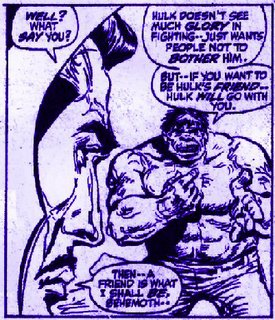Marvel Feature Presents The Defenders #1
Dr. Strange has just returned to his life in Greenwich Village, and as the scene opens, we see Wong bringing him tea. But then a mystic voice calls out to Dr. Strange. It takes Dr. Strange a few seconds to catch on; in the mean time he accuses Wong of calling his name repeatedly (which would be a strange joke for Wong to play on his boss). After realizing it must be a mystic voice, Dr. Strange sends his astral body out to look around. He visits a hospital where two doctors and a nurse are discussing a patient who is about to die. Dr. Strange identifies him as Yandroth an Evil Scientist he met in another dimension.
Yandroth reveals his master plan. He has constructed a mystic computer that will ignite all the worlds stockpiles, and destroy the world. As he puts it, “EVERY man wants the world to END when he dies but only I shall FULFILL that dream!” I don’t know. I’ve never really dreamed of the world ending when I die. I dream more about eating a really big sandwich.
Anyway Dr. Strange quickly determines that the world ending would be a bad thing, so he commands the Doctors in the hospital to stop their lunch break, and march robotically into cure Yandroth. Unfortunately they can’t save Yandroth, but they do give an important clue to Dr. Strange (his mailing address). Dr. Strange flies his astral form back to his body.
Dr. Strange in a strange fit of humility, realizes he needs some help to take on this machine; and so seeks out the Sub-Mariner (who is swimming with his head out of water, luckily). They have a short palaver, and the Sub-Mariner is persuaded that the world being destroyed by atomic bombs would be bad. After that they try to find other allies (Namor references his recent adventures with the Hulk and the Silver Surfer). The Silver Surfer is unavailable (he has been hurt; not badly, but enough that he will be of no help). Thor is doubtless “battling menaces on world’s beyond our ken.” Dr. Strange jut pretty much jumps to that conclusion immediately.

That leaves the Hulk. So Dr. Strange sends out his astral body to talk to the Hulk. And by talk, I mean trip and then insult. This mildly upsets the Hulk who promises to follow Dr. Strange to the end of the earth (out of anger). Once Dr. Strange leads him back to the Sub-Mariner, they cage him and he agrees to listen to them. Dr. Strange explains that there is danger coming, that only the Hulk can help with. Hulk reasons that if Dr. Strange wants to be his friend he will go along with it. Then we have a meaningless display of Dr. Strange’s powers as two old people see Dr. Strange in his costume, but he then makes them see him in a business suit (looking quite sleazy). The oldsters direct them to a lighthouse where the evil machine lurks.
The Hulk and the Sub-Mariner burst in (Hulk from land, the Sub-Mariner from under the ocean), defeating numerous traps along the way. Then Dr. Strange goes in in his astral form and is told by the machine (which is ugly by the way) that when the Hulk and Sub-Mariner punch the machine, their awesome power will fuel the machine, giving it the power to accomplish it’s evil plans.
So, let’s summarize Yandroth’s evil plan. He constructs an Evil Machine, then gets himself killed. He summons Dr. Strange before he dies so he can tell Dr. Strange about the Evil Machine. Then he trusts Dr. Strange to take along enough muscle to provide the energy to power his Evil Machine. Yeah that seems overly complicated to me.
Anyway Dr. Strange keeps the Hulk and Sub-Mariner from attacking the Machine by casting illusions that make them see the other as super threatening. So they attack each other, instead of the Machine. Then Dr. Strange defeats the machine, by summoning the awesome power of time; so that each second takes an eon for the machine. And then he un-illusions the Hulk and the Sub-Mariner.
So let’s summarize the Hulk and Sub-Mariner’s contribution to this story. Dr. Strange goes and finds them, which fills up a few pages. Then they crush through the Evil Machine’s defenses. Then Dr. Strange has to keep them from destroying the world, by forcing them to fight each other. Then they go away. There’s a reason the Defenders are called the “un-Team.”
Anyway they conclude with this final conversation.
Sub-Mariner – “Aye It’s best that we part. For, we all but caused the Earth’s DESTRUCTION– while we sought to be it’s valiant DEFENDERS.”
Dr. Strange – “DEFENDERS! A fitting NAME for such a grouping as we – if ever we’ve need to meet AGAIN.
Hulk – “Hulk NEVER wants to get together again. NEVER! Hulk was IN group once – called AVENGERS. Didn’t LIKE it.”
There’s also a back up story involving Dr. Strange returning to being a hero, but it’s not very interesting. Oh and sorry for the panel this time. It didn't scan very well, and I couldn't get it to look that much better.

